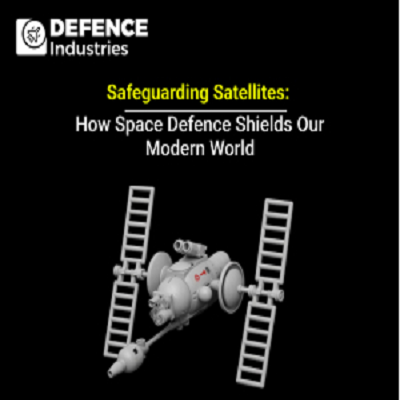Safeguarding Satellites: How Space Defence shields Our Modern World

In today's technologically driven world, satellites play a pivotal role in our daily lives, facilitating communication, navigation, weather forecasting, and a myriad of other crucial functions. Yet, the increasing reliance on these sophisticated devices has made them vulnerable to potential threats from both natural phenomena and human-made disruptions. As a result, the need for effective space defense has become more pressing than ever.
The Importance of Satellites
Satellites serve as the unsung heroes of the modern era, silently orbiting the Earth and enabling seamless global connectivity. Communication satellites, for instance, allow us to make phone calls, access the internet, and broadcast television programs across continents. Furthermore, weather satellites provide critical data for forecasting natural disasters, enabling timely evacuation measures and reducing the loss of life and property. Global positioning system (GPS) satellites offer precise navigation, aiding everyone from commuters to pilots and maritime vessels. Agricultural monitoring satellites assist in maximizing crop yield and ensuring food security. Without these orbiting sentinels, the smooth functioning of our interconnected world would be severely compromised.
Emerging Threats in Space
However, these essential satellites face an array of threats that can jeopardize their operations and disrupt the services they provide. One of the foremost threats originates from space debris, which includes defunct satellites, spent rocket stages, and other remnants of human space exploration. As the volume of space debris continues to increase, the risk of collisions rises, potentially causing irreparable damage to operational satellites and creating cascading debris that can further threaten other satellites in orbit.
Additionally, the surge in anti-satellite weapons and the potential for hostile activities in space pose significant security concerns. Several nations have developed capabilities to launch missiles or other systems that can disrupt or destroy satellites, leading to potential communication blackouts, GPS inaccuracies, and a loss of critical data. The increasing militarization of space has raised alarms globally, emphasizing the urgency for robust space defense mechanisms.
Countering the Threats
Efforts to protect satellites and maintain the integrity of space operations are multifaceted, involving advanced technologies, international cooperation, and stringent regulatory frameworks. One of the primary strategies for safeguarding satellites involves the development of robust space situational awareness (SSA) systems. These systems actively monitor the space environment, tracking both natural and artificial objects to predict potential collisions and facilitate timely maneuvers to avoid them. Additionally, SSA helps identify potential hostile activities, allowing for preemptive defensive measures.
Moreover, the implementation of enhanced satellite design and construction standards can help improve resilience against space debris and potential attacks. Incorporating shielding mechanisms and employing resilient materials can reduce the susceptibility of satellites to damage from high-velocity space debris or kinetic attacks.
Furthermore, international collaboration plays a vital role in fostering space security. Initiatives such as the European Union's Space Surveillance and Tracking (EUSST) program and the United States' Space Data Association (SDA) promote data sharing and cooperative monitoring, enhancing global awareness and response capabilities. These collaborative efforts facilitate early warning and enable coordinated responses to potential threats, thereby strengthening the collective resilience of satellite systems worldwide.
Legal and Diplomatic Frameworks
In addition to technological advancements, the development of comprehensive legal and diplomatic frameworks is crucial in ensuring responsible and sustainable space activities. International agreements such as the Outer Space Treaty and the Space Debris Mitigation Guidelines aim to regulate space activities, prevent the weaponization of space, and promote the peaceful use of outer space. These agreements foster transparency and accountability among nations, discouraging hostile actions and promoting responsible behavior in space operations.
Furthermore, diplomatic efforts to promote space sustainability and the peaceful resolution of disputes are essential. Diplomatic channels facilitate discussions on space security issues, fostering mutual understanding and trust among nations. The promotion of dialogue and cooperation reduces the likelihood of conflicts and encourages the adoption of diplomatic solutions to potential disputes, ensuring the continued peaceful exploration and utilization of outer space.
Investing in Future Technologies
Looking ahead, the development of innovative technologies holds the key to bolstering space defense capabilities. Research and development initiatives focusing on the deployment of advanced sensors, autonomous maneuvering systems, and active debris removal technologies are critical in mitigating space debris threats and enhancing the resilience of satellite systems. Additionally, the exploration of alternative communication methods, such as laser-based communication systems, can provide more secure and efficient data transmission, reducing the susceptibility of satellite communication networks to disruptions.
Educating the Public
Equally important is the need to raise public awareness about the significance of space defense and its implications for everyday life. Educating the public about the critical role of satellites in various aspects of modern society can foster a sense of responsibility and encourage support for initiatives aimed at protecting space assets. Public engagement can also influence policy decisions, driving governments and international organizations to allocate resources and prioritize efforts to ensure the security and sustainability of space operations.
Final Thoughts
In an era defined by technological interconnectedness, the protection of satellites is not just a matter of national security but a global imperative. The safeguarding of these vital assets requires a multifaceted approach, encompassing advanced technologies, international cooperation, legal frameworks, and public awareness. By prioritizing space defense initiatives, we can ensure the uninterrupted functioning of satellite-dependent services and pave the way for a secure and sustainable future in space exploration and utilization.









